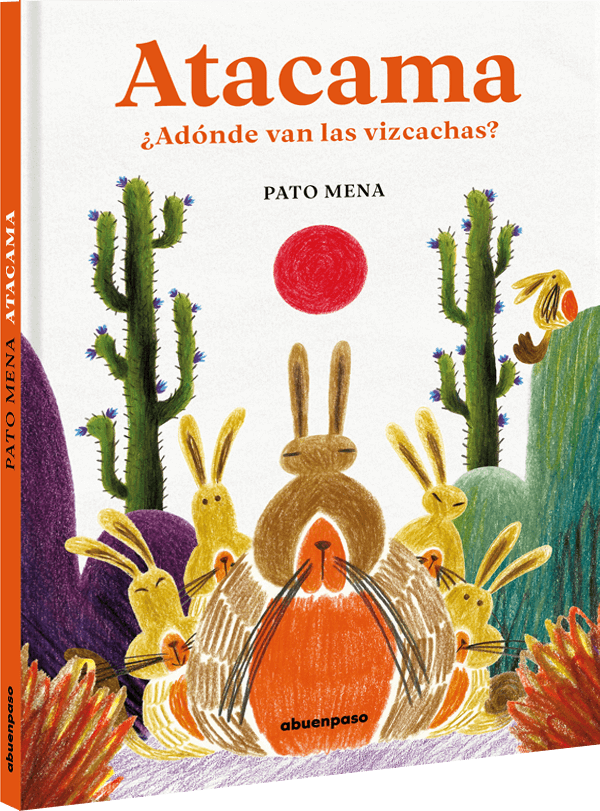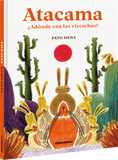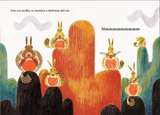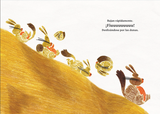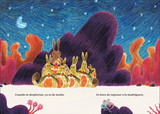Related Books
You may also like:
Kaaliawiri, el árbol de la vida / Bilderbuch Spanisch / Francisco Ortiz / Illustration von Ciça Fittipaldi
You may also like:
Fernanda / Bilderbuch Spanisch / Daniela Pabón Llinás / Illustration von Jorge Mato Troche
You may also like:
Una sombra sobre toda la tierra / Bilderbuch Spanisch / Rafael Yockteng und Jairo Buitrago
You may also like:
Tu fantástico cuerpo / Bilderbuch Spanisch / Pernille Engsig Eskilden y Jakob Brodersen / Illustration von Kamilla Wichmann
You may also like:
Alergias / Bilderbuch Spanisch / Katya Klimova
Atacama. ¿Adónde van las vizcachas? / Bilderbuch Spanisch / Pato Mena
Für Kinder ab 3 Jahren
Las vizcachas son unos simpáticos roedores que viven en el desierto de Atacama y que aman tomar el sol en familia. Están siempre atentas a lo que indica el vizcachón que vela para que todas estén a salvo de los animales y las calamidades que se encuentran en los imponentes paisajes del desierto. Cuando llega la noche, será la más pequeña de la familia la que repare en el regalo que el desierto les ofrece al final del día. Tal como ya hizo en Onsen. ¿Qué hacen los monos?, Pato Mena, jugando con palabras, ilustraciones y pictogramas, cuenta una historia que despertará la curiosidad de todos sus lectores. Además, en esta nueva obra, nos descubre la maravilla y la biodiversidad del desierto de Atacama, los animales que lo habitan, sus colores, sus paisajes y su majestuoso cielo nocturno.
-------------------------------------------
"The vizcachas are friendly rodents that live in the Atacama desert and love to sunbathe as a family. They are always attentive to what the vizcachón indicates that watches over them so that they are all safe from the animals and the calamities that are found in the impressive desert landscapes. When night falls, it will be the smallest of the family who notices the gift that the desert offers them at the end of the day. Just like she already did in Onsen. What do the monkeys do?, Pato Mena, playing with words, illustrations and pictograms, tells a story that will arouse the curiosity of all his readers. Furthermore, in this new work, he reveals to us the wonder and biodiversity of the Atacama desert, the animals that inhabit it, its colors, its landscapes and its majestic night sky."
© abuenpaso.
| Titel | Atacama. ¿Adónde van las vizcachas? / Bilderbuch Spanisch / Pato Mena |
| Kurator | mundo azul |
| Typ | Bilderbuch Spanisch |
| ISBN | |
| Online seit | Jun 30, 2023 |
Für Kinder ab 3 Jahren
Las vizcachas son unos simpáticos roedores que viven en el desierto de Atacama y que aman tomar el sol en familia. Están siempre atentas a lo que indica el vizcachón que vela para que todas estén a salvo de los animales y las calamidades que se encuentran en los imponentes paisajes del desierto. Cuando llega la noche, será la más pequeña de la familia la que repare en el regalo que el desierto les ofrece al final del día. Tal como ya hizo en Onsen. ¿Qué hacen los monos?, Pato Mena, jugando con palabras, ilustraciones y pictogramas, cuenta una historia que despertará la curiosidad de todos sus lectores. Además, en esta nueva obra, nos descubre la maravilla y la biodiversidad del desierto de Atacama, los animales que lo habitan, sus colores, sus paisajes y su majestuoso cielo nocturno.
-------------------------------------------
"The vizcachas are friendly rodents that live in the Atacama desert and love to sunbathe as a family. They are always attentive to what the vizcachón indicates that watches over them so that they are all safe from the animals and the calamities that are found in the impressive desert landscapes. When night falls, it will be the smallest of the family who notices the gift that the desert offers them at the end of the day. Just like she already did in Onsen. What do the monkeys do?, Pato Mena, playing with words, illustrations and pictograms, tells a story that will arouse the curiosity of all his readers. Furthermore, in this new work, he reveals to us the wonder and biodiversity of the Atacama desert, the animals that inhabit it, its colors, its landscapes and its majestic night sky."
© abuenpaso.






